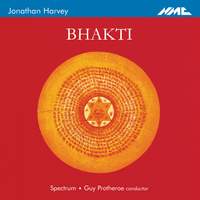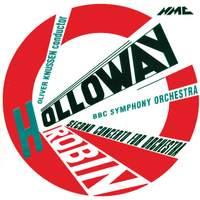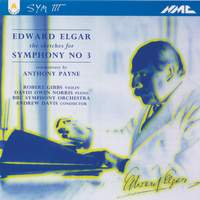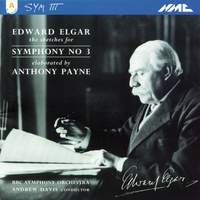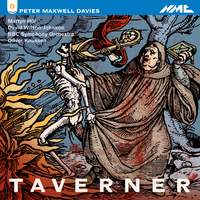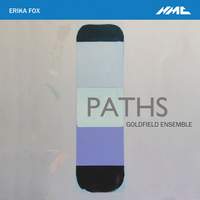Interview,
Colin Matthews on NMC
 This year sees the 30th anniversary of the establishment of NMC (originally "New Music Cassettes"), a label set up with the primary goal of showcasing music by contemporary British composers.
This year sees the 30th anniversary of the establishment of NMC (originally "New Music Cassettes"), a label set up with the primary goal of showcasing music by contemporary British composers.
Founder Colin Matthews has been closely involved with NMC throughout the past three decades; I spoke to him about the changes he's seen in that time, and about how NMC fits into the broader world of recorded contemporary music.
How did NMC come into being, and what was your ‘mission statement’ when the label started out?
NMC came about through discussions I’d had with Imogen Holst back in 1984 about how best the newly established Holst Foundation could support contemporary music. It took several years before we were able to set up a recording company which could function as a charity. Our principal aim was to fill the huge gap in the representation of living British composers, recording their music to the highest standards. We started with a long ‘hit list’, which took nearly 20 years to work through; as younger composers have come on the scene the original hit list has grown in the same way that the recorded catalogue has grown.
How has your own role with NMC altered over these past three decades?
In the early days, with only one person to look after the administration, I had to be totally hands on, and I produced a majority of our first 50 or so recordings, and was involved with every aspect of the label. As we’ve grown I’ve been able gradually to take more of a back seat, and although I still produce the occasional disc and help with all decision making, with our very supportive and helpful board and a wonderful team in the office I know everything is in safe hands.
I was speaking to another artist celebrating their thirtieth anniversary recently, and she observed that appetites for niche repertoire appear to have increased significantly over the course of her career; do you think that there’s been a similar uptake in contemporary music over the course of NMC’s history?
I don’t think it’s quite the same thing, since that ‘niche’ repertoire tends to consist largely of neglected music from the past, whereas what we’ve been trying to do is to reflect what’s happening today - much less safe ground to be on. I’m a bit frustrated that we don’t reach a larger audience - although that’s something that downloads and streaming are beginning to remedy; and I hope that we’ve had an influence on the contemporary scene – a niche, admittedly, but a very healthy one.
How would you compare NMC’s identity with other contemporary classical labels such as ECM or the contemporary music arm of Deutsche Grammophon – particularly in terms of drawing boundaries between ‘classical’ and jazz/electronica?
Both of those labels have done excellent work, but ECM is more artist based, while DG’s 20/21 series is founded more on re-releases from their impressive back catalogue, and of course covers a much wider area than we are able to do, since we’re restricted, except in a few cases, to British composers. We’ve only dipped our toes so far into different repertoire, but we’re increasingly open to greater diversity.
How does the A&R side of the things generally play out: do you tend to talent-scout emerging voices, or is it more usual for composers to be proactive about approaching the label with projects?
A mixture : although initially we took the proactive role in selecting repertoire, in recent years we’ve largely switched to inviting submissions - we can’t talent-scout everyone, and want to encourage composers who might not think they can be part of NMC. But because we have limited space for future releases this has come to a temporary halt while we do our best to catch up with everything that we’re planning over the next few years.
The recording industry in general (and particularly the ways in which people consume music and organise their collections) has altered hugely over the thirty years you’ve been in business: are physical sales still thriving for you, and have you seen any unexpected ‘hit’ tracks thanks to your presence on streaming services?
Ten years or so ago we thought that physical sales would have reduced to a trickle by now, and we were pioneers in releasing downloads in anticipation of this. To our surprise the physical market has remained strong, and we’re a long way from download only - except where we offer bonus tracks, and in some areas where the physical product isn’t appropriate. John White’s Piano Sonatas, recorded by Roger Smalley in 1996, have been a completely unexpected big hit on Spotify.
After winning Gramophone’s Special Achievement Award in 2017, you and Sir Mark Elder spoke about NMC’s move into music education: what’s happened since then, and what are your plans for the future on this front?
We’ve begun collaborations on several fronts - with Rhinegold’s Online Music Classroom, a GCSE teaching resource with Rambert Dance Company, and creative software with r:string. We’ve worked on education projects with Sage Gateshead and Sound and Music, and with the Aurora Orchestra. Most recently we’ve produced Many Voices together with London Music Masters, aimed at primary school string players, and for the first time we’ve published the sheet music alongside the CD. Lots more to come!
Finally, can I ask you to select five or six recordings which you’d consider to be real landmarks for the label?
I have to start with Jonathan Harvey’s Bhakti, our first recording - but not simply because it’s NMCD001: it set a marker for what we intended to do – a major work by a composer who was barely represented on disc. Continuing in chronological order of release, Robin Holloway’s remarkable Second Concerto for Orchestra won us our first Gramophone Award. Then the two recordings that more than any others put us on the map – Anthony Payne’s realisation of Elgar’s Third Symphony and Harrison Birtwistle’s Mask of Orpheus. I was very involved with both of these, helping to persuade the Elgar family that it was something that had to be done; and intensive work with Ian Dearden on the complexities of the BBC concert recording of Orpheus. Our relationship with the BBC Symphony Orchestra was very important in these early years, and it was a high point when we managed to release Olly Knussen’s studio recording of Peter Maxwell Davies’ Taverner, a work that had been on our hit list right from the start. Of our more recent recordings there are so many that I’m proud of that I think it would be invidious to single one out. But I’m looking forward to our imminent release of the first solo disc for Erika Fox, 83 this year.
Photograph of Colin Matthews courtesy of Fiona Garden and NMC.
As part of the NMC anniversary celebrations, we're offering up to 40% off all recordings on the label, including downloads, until 17th June 2019.
Recordings referenced in this interview
Spectrum, Guy Protheroe
Available Formats: CD, MP3, FLAC
BBC Symphony Orchestra, Oliver Knussen, Stefan Asbury (assistant conductor)
Available Formats: CD, MP3, FLAC
Anthony Payne (narrator), Robert Gibbs (violin), David Owen Norris (piano), BBC Symphony Orchestra, Andrew Davis
Available Formats: CD, MP3, FLAC
BBC Symphony Orchestra, Andrew Davis
Available Formats: CD, MP3, FLAC
Martyn Hill (Taverner), David Wilson-Johnson (Jester), Stephen Richardson (Henry VIII), Fiona Kimm (Virgin Mary), Michael Chance (Priest/God), Quentin Hayes (White Abbot) & Peter Sidhom (Richard Taverner); London Voices, BBC Symphony Orchestra, Fretwork, New London Children's Choir Oliver Knussen
Available Formats: 2 CDs, MP3, FLAC
Due for release on 28th June 2019.
Available Formats: CD, MP3, FLAC, Hi-Res FLAC


